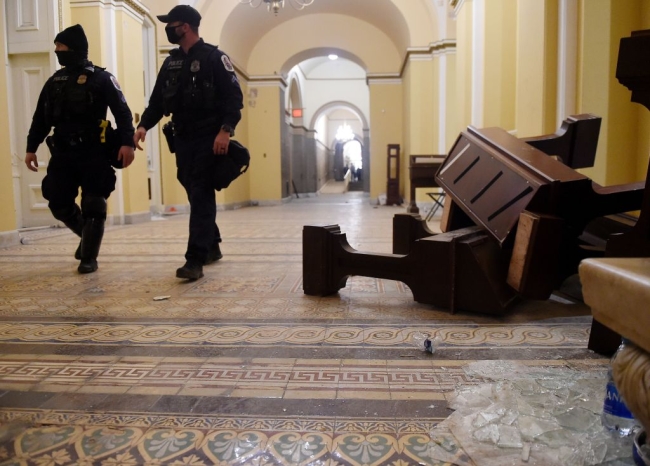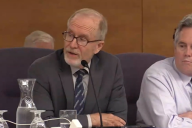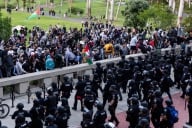You have /5 articles left.
Sign up for a free account or log in.

Damage inside the U.S. Capitol building after it was overrun by Trump supporters Wednesday.
OLIVIER DOULIERY/Contributor via Getty Images
Paul Pribbenow, president of Augsburg University in Minneapolis, was leading a plenary panel on college presidential leadership at the Council of Independent Colleges’ virtual Presidents Institute when he first saw news of the attack on the U.S. Capitol building Wednesday. Attendees also became distracted by the violence and asked Pribbenow and his colleagues versions of the same question: What should we do?
“There’s a firm sense that our colleges and university communities are asking us to say something and do something,” Pribbenow said. The calls for responses from presidents were similar to community calls for action after a police officer killed George Floyd, an unarmed Black man, in May, setting off nationwide protests.
Organizers of the annual CIC conference, which had been focused primarily on the effects of the pandemic at private colleges, as well as race and diversity conversations, shifted the schedule to include a last-minute session titled "What Do Yesterday’s Events Mean for Your Campus?" More than 50 presidents attended the session, Pribbenow said. Thursday’s session on presidential crisis communication was also tweaked to address the riots.
It’s not the first time CIC has adapted its annual meeting for presidents to accommodate developing news, said Richard Ekman, president of CIC. Like many people, Ekman said, college president attendees knew political unrest was boiling under the surface for a while.
“We knew this was going to happen, and it’s terrible,” he said. “But on the other hand, when you actually see it happen -- people were shocked, truly shocked.”
College presidents had already seen explosive confrontations on their own campuses, he said, though none were as destructive as the riots at the U.S. Capitol Wednesday. College presidents knew political tensions on their own campuses were in some ways representative of the country’s greater political narrative.
“We’ve been worried for some years now about divisiveness and lack of civility on our campuses when controversial issues get talked about,” Ekman said.
Ekman and Pribbenow both referred to a session earlier this week with Danielle Allen, a professor and political theorist at Harvard University. As part of her talk, Allen spoke about the need for better civics and American history education, which Ekman and Pribbenow agree would be beneficial for all colleges in light of recent events.
During Thursday’s special session, presidents agreed they should put out a statement addressing the violence at the Capitol, but some discussion unfolded over how best to word them, Pribbenow said. It’s common for presidents to get caught up by what he calls both-sides-ism.
“Sometimes presidents feel they have to be neutral in these kinds of situations and try to respond to what they know to be diverse perspectives on their campuses,” he said. “I think that was something people were really wrestling with, especially if personally they were deeply concerned about this.”
Many presidents were concerned about the racism displayed during the riots and the impact it will have on their students and employees, especially at colleges like Augsburg that serve many students of color, Pribbenow said. Some have argued the police response at the Capitol was weak, especially in comparison to the aggressive tactics police used against Black Lives Matter protesters in Washington, D.C., over the summer.
Photos of “the noose hanging, the Confederate flags in the halls of Congress, the lack of police presence and response in comparison to what we saw earlier this summer -- the historic trauma that our students of color face only gets exacerbated when you see those pictures and you see that news,” he said.
Presidents from private colleges in more conservative parts of the country discussed the tension of being stereotyped as “too liberal” by their communities. They acknowledged that students and employees could be supportive of the riots defending Trump.
“A couple of them were in Missouri, and here’s their senator basically leading the charge,” Pribbenow said, referring to Republican senator Josh Hawley, who objected to the certification of the presidential election. “And students they serve come out of places where they voted for this person to be their senator and, who knows, they may well agree with him.”
Presidents agreed that as educators, their institutions must find ways to show students how to be civically engaged without resorting violence, riots or vitriol.
“As institutions we need to model healthy democratic engagement so that students see that as a counter to what’s going on in Washington,” Pribbenow said.








